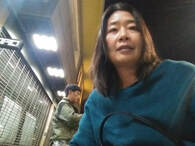|
Short Fiction ~ Niles Reddick Maggie left this world on Christmas Day at the hospital, the family was devastated, and the tragedy will forever be etched in the memory for all their future Christmases. “It just won’t be the same without Mama,” her daughter said at the funeral home when she made the arrangements. Maggie didn't want to hang on any longer. She had grown weary even before she felt sick of the materialism of the season, the fretting over gifts, the worry of who would bring what dish to dinner on Christmas Eve, of whether the house was cleaned and how the furniture was arranged to accommodate everyone, of whether she could maintain a friendly smile at the son-in-law who'd hit her precious daughter, and how awkward it might be since her daughter was struggling to leave or stay and go to counseling. When they gave Maggie Morphine, she simply closed her eyes and listened to the hymns coming from the television that costs five dollars a day that Medicare wouldn’t cover, and she took a deep breath when Mariah Carey naturally slipped up multiple octaves on “Oh, night, divine” and had goose bumps on her arms, felt the warmth as she sat up, climbed out of bed, and looked back at what had become an old woman. Maggie stepped into the hallway, saw a familiar childhood friend she'd gone all through school with, and said hello. They hugged, clasped hands, and walked like they had done so many times in childhood to church, to school, to the store for cherry cokes and peanuts. They walked past the nurses’ station where there was a flutter of activity because Maggie's monitors were beeping, and on into the next hall toward the window, and into the evening sky toward the Pleiades cluster.  Niles Reddick is author of the novel Drifting too far from the Shore, two collections Reading the Coffee Grounds and Road Kill Art and Other Oddities, and a novella Lead Me Home. His work has been featured in eleven anthologies and in over two hundred literary magazines including The Saturday Evening Post, PIF, New Reader Magazine, Forth Magazine, Cheap Pop, Flash Fiction Magazine, With Painted Words, among many others.
4 Comments
Short Fiction ~ Neil Campbell First Prize, Strands International Flash Fiction Competition -5 Twice a week Mary wheeled her trolley down the hill, over the railway crossing and along the canal to the big Tesco in Whaley Bridge. She said hello to the people she saw sitting on their narrow boats and waved at the horses in the fields next to the sewage plant. She never liked the idea of living on a narrow boat, especially in winter, when the frozen water encased your home in ice. You could only ever go anywhere slowly and there would be all the locks to navigate. She continued along the towpath and under another footbridge giving access to Bridgemont and with a sign on it advertising a beer festival. At the canal junction near Whaley Basin she had to struggle across a little metal footbridge going over the water, and then down a small hill and through the car park. Coming home was even more tiring because of the weight of the trolley and the walking already done. In all weathers of the High Peak she walked the towpath there and back to go shopping. She felt that it kept her strong. She could have got on the 199 with her bus pass, but that’s how stubborn she was about getting her exercise. And the buses were full of old people and she hated talking to old people because all they ever talked about was being old. The last time she went shopping the canal was frozen solid as she struggled along the towpath. The wheels of her trolley stuck time and again in the wind sculpted piles of snow. She struggled a final time at the trolley and fell face forward. At first, she tried to get up but then she decided to stay there. After twenty-three years as a widow she could make that decision for herself. The snow continued to fall and started coming down more heavily, so that by nightfall Mary and her trolley were fully covered over in thick snow. The temperature dropped sharply that night, encasing her in a frosted tomb. In the afternoon a couple of teenagers who’d been cycling down the towpath started jumping over the hump in the sunlight. Over and over they jumped, turning around, coming back and jumping again, until grey hair appeared through the melting snow.  Neil Campbell is from Manchester, England and his latest novel Lanyards, the third part of a Manchester trilogy, is out now. http://ncampbellwriter.wixsite.com/website Short Fiction ~ Susmita Bhattacharya Second Prize, Strands International Flash Fiction Competition - 5 The dandiya beats are at the highest permitted decibel. The building society has spared no cost in setting up the most extravagant dance floor in the locality. Sand has been brought in from the white beaches of the Lakshadweep Islands (so the managing committee say, but it may be from the local one with healthy doses of chalk powder). There’s a live band and none other than Falguni Pathak is bringing the roof down with her ‘Maine Payal Jo Chankayi’. A Big Boss celebrity has been invited to inaugurate the nine days of dancing and revelry. There is a buffet and the men are crowding around the security-man’s shed – a makeshift bar, with the security man guarding the entrance fiercely, a bottle of Johnny Walker stashed in his satchel for later. And the dancers – oh the dancers shimmering in their mirror-work skirts, close-cropped blouses, sequinned dupattas. Glossy hair. Shining teeth. Sparkling eyes. Nimble feet. She watches from the balcony. She twists the rosary beads around her fingers, her feet tapping to the rhythm of the synthesizer’s beats. She too had danced with her sisters once. And then with her husband and sisters-in-law. Her braided hair whipping the electric air, her skirt whirling while she twirled expertly, hitting her partner’s dandiya sticks with precision before moving on in the circle, moving, moving, moving… She listens to the song playing now – an old classic remixed for the younger crowd – she sways to the rhythm, remembering his breath on her face, his hands on her waist. He’s been gone a long time, his memory keeping her company now. The others are downstairs, dancing. She helped tie their blouses, add flowers to their braids, slip the bangles and earrings on. Then they kissed her and disappeared, not turning back once to acknowledge that she’d been left behind. Alone. They had their own dreams to pursue. A tap on her shoulder. ‘What are you doing here? You should be down there.’ Arms encircle her, and she turns around and embraces him. ‘What are you doing here?’ She asks him. ‘The girls are waiting for you downstairs. Go and win their hearts.’ ‘They can wait,’ he says. She catches the slight American twang as he speaks. He smells different too. Not the cosy scent of milk and rice, of ghee smothered sweets she’d feed him. He’s so much taller than her now. And so thin. ‘Don’t they feed you in America?’ she complains, measuring the width of his wrist with her fingers. ‘Such a rich country, and yet my grandson returns skinny as a stick.’ He laughs and it’s the same laugh that she has tucked away in her heart. ‘Come,’ he says and leads her into the sitting room. He helps her into a pair of Nike trainers he’s got her for her morning walks. He places dandiya sticks in her hands. As the music floats up from the festivity downstairs, he spins her around. ‘We’re going to dance first,’ he says. And she does.  Susmita Bhattacharya is an Indian-born British writer. She won the Winchester Writers’ Festival Memoir Prize in 2016 and her novel, The Normal State of Mind (Parthian/Bee Books) was longlisted for the Words to Screen Prize at the Mumbai Association of Moving Images (MAMI) festival in India. She has been shortlisted for, and won, numerous prizes and awards and her work has been commissioned by magazines and for BBC Radio 4. Her most recent collection of short stories, Table Manners, was published by Dahlia Books (2018). It won the Saboteur Short Story Collection Prize in 2019, was finalist for the DLF Hall & Woodhouse Literary Prize and will be serialised for BBC Radio 4 Extra in January 2020. She lectures at Winchester University, facilitates the Mayflower Young Writers workshops in Southampton (An ACE funded ArtfulScribe project), and is a mentor supporting BAME writers for the Middle Way Mentoring project. Currently, she is working on her second novel. Short Fiction ~ Steve Wade Third Prize, Strands International Flash Fiction Prize - 5 Seven months spent in a correctional facility, Martin Daly had been released that morning. His crime – an accumulation of social misdemeanours ranging from language misuse to anti-social behaviour. He had dared to flout the law by having the temerity to put together sentences of his own instead of sticking to the utterances programmed into his brain. But the aberration which really convinced the presiding judge of his delinquency was Daly’s perverted need for the attention of young women his own age. When he stepped inside the café, its interior set alight a fire in his cheeks. Daly closed his eyes. On the inside of his eyelids, he scrolled down through the latest news. As usual, most of the headlines concentrated on the deteriorating health of the aging US president, Leonardo DiCaprio. On a double term in office, the media lamented the possibility that he wouldn’t see out his second term. Journalists engaged in their obsession with what his possible successor Yolanda Renee King would bring to office. Martin Daly opened his eyes and massaged his temples with his fingertips. An old woman dressed in obligatory retirement clothes was leaving a table. The table the old woman had left was full of café detritus. A roboserf appeared and cleared it away. It then asked Daly for his order. “A rejuvenator,” he said. “With pollen concentrate.” “Any solids?” it said. “No,” he said. It served him. He took a generous gulp. Stimulated, with the boost from his drink running through him, Daly sat back and went over some of the lessons he’d been given during rehabilitation classes in the correctional facility. Getting himself to a place of temptation was the first step. The next was to look at the women, ensuring he kept to the two-second glance permissible under law. Martin Daly lifted his mug to his lips, tilted back his head, and drained the dregs of his drink. Now he was ready. Without moving his head, he swept his eyes over the women seated at the tables. He paused, before retracing the arc like a sweeping searchlight. He’d noticed a particular woman. He looked at her, looked away, and again allowed the legally-allocated time to examine her closer. Something clutched at his chest from inside. In the dim light, together with his myopia, he couldn’t be sure. But when he readjusted his eyesight through the controls in his palm, he saw that he was right. This woman was staring at him. Panic and excitement churned about in his stomach. That’s when he saw across her pretty face break a smile. A smile at him. For him. A wave of dizziness sloshed about behind his eyes. No woman, apart from his surrogate carer as he was growing up, had ever smiled at him. What to do? Where to look? He raised his hand to his forehead and peered through the mesh of his splayed fingers. Now the woman, while still looking his way, had one of her fingers to her lips, the fingernail of it between her clenched teeth. As though something outside his own control were pushing him, he found himself getting up and working his way around the tables to her. He watched the tip of a pink tongue slip from her mouth and brush across her upper lip. “Hey,” Daly said. “There you are.” “Hi. I’ve been waiting for you,” she said, playing right along. Using the gesture reserved for breeding couples only, he put his hand on her right shoulder and squeezed. A gesture familiar to every citizen but used by the select few. Next she was on her feet, her hand slipping into his and holding tight. Through his hand and shooting up his arm and into his head, he felt a bolt of lightning. So this was what it felt like to touch mutually someone of the opposite gender. No wonder the government had long since outlawed such contact as a way of ensuring the world population remained at a sustainable level. Together they made their way towards the exit and out into the street. The artificially cooled air played about his face, which made him realise it also caressed this woman’s face. It felt strange to consider the effects of the world about him on another. And with her hand clenched in his, the feeling more than a thought came to him about where his body ended and hers began. He didn’t know. Only now did he understand and fully appreciate the feeling of liberty. Of what it meant to be free. Until this moment, it mattered not whether he spent his days beneath the roof of the correctional facility or plodded through the streets, toing and froing on the mindless journey of drudgery between home and work. Never had he appreciated the way the simulated evening sunshine gilded the buildings in gold. Nor had he ever really heard the song of the blackbird the way he did the one perched on an overhead shuttle cable. Its full-throated warbling, with its yellow beak open and head pointing at the sky, as stunning a sight as he had ever seen through the streaming in his head. But reality hadn’t been something anybody could keep away for too long over the past couple of generations. The blackbird’s singing was cut off as though a button had been tapped. The falcon, which had seized the bird in its talons, righted its kill with its beak and toes before lifting off into the sky. A few feathers fluttered about and sailed softly to the ground. That’s when Martin Daly felt a jolt of electricity rushing through his system. This caused his arms to clamp together at the wrists. Overhead the whirring of a police drone. “You’re under arrest,” the woman from the café said, and read him his rights. “For attempting to solicit for social engagement someone of the opposite sex.” Martin Daly clenched his teeth, a sense of relief and dread played about inside his head.  Steve Wade’s award winning short fiction has been widely published and anthologised. He has had stories shortlisted for the Francis McManus Short Story Competition and for the Hennessy Award. His stories have appeared in over fifty print publications, including Strands Publishing, Fjords, Boyne Berries, Crannog, Bridge House Publishing, New Fables, and Aesthetica Creative Works Annual. He has won First Prize in the Delvin Garradrimna Short Story Competition on four occasions. Winner of the Short Story category in the Write by the Sea writing competition 2019. He was a prize nominee for the PEN/O’Henry Award, and a prize nominee for the Pushcart Prize. www.stephenwade.ie Short Fiction ~ Rachel J. Fenton Honourable Mention, Strands International Flash Fiction Competition -5 One hand on the lock that had been broken a decade ago, it was as obvious to Kiri as Andrew’s bare feet that what he had to say could only be spoken outside this house where everything between them had fallen away. The cliff spanned the length of the beach, orange and unstable as if sediment had been combed there. Nested at intervals, pigeons cooed, jutted their heads like animated hieroglyphs. Andrew turned to look at them and Kiri called out just in time to stop him planting his foot into the giant turd left like an unexploded bomb on the low sea wall. They climbed down and picked their way through the mussel nurseries, Kiri gingerly stepping into rock pools where crossing the sharp shells was impossible, Andrew striding. Andrew used to tell Kiri about the creatures he and Georgie had seen in the pools, as if auditioning to be the next David Attenborough. ‘Dip your feet in and shrimp nibble your dead skin,’ he’d say. Later, he’d grumble. ‘You’re always busy ruining the planet instead of getting out and enjoying it.’ But he’d given up broadcasting. Sunlight bounced off the water, cast patterns on him. Kiri remembered the nights they used to spend watching the slide shows he put together of all Georgie’s milestones: eating her first solids, sitting up by herself, crawling. ‘I might have a swim.’ Andrew took off his shirt. He looked at it a moment then threw it a little distance from them. Kiri brought her hand to her side. Few but the habitual swimmers and dog walkers took advantage of the lack of lifeguards to occupy the beach this time of year. He moved as if doing breast-stroke, but even through the distortions in the water, Kiri could see he was walking on a sandbank. His legs reminded Kiri of the way he taught Georgie how to swim, with her belly supported by two dining chairs and him holding her feet, heels turned out to kick, frog-like. A woman with a large retriever saluted two power-walkers whose Pomeranians were too small to keep up, and the group stopped and stared as little arse-holes were made amenable to the big head. Kiri suspected the retriever was responsible for the bomb on the sea wall. Andrew bobbed rhythmically. Kiri picked up his shirt, shook off the sand. He made his way to shore. ‘You cheated.’ She couldn’t be sure how conversation between them would turn out. He nodded, the way he did when he laughed but for his making no sound. There was a pigeon on the sea wall. It looked up as small then larger then big stones cascaded, only flying off after one hit the top of its head and forced its beak into its crop. Kiri turned to see if Andrew had followed her. He could have been waving at anyone.  Rachel J Fenton's fiction won the University of Plymouth Short Fiction Prize, Auckland University of Technology Creative Writing Prize, and came second in the Dundee International Book Prize. She lives in Aotearoa New Zealand. Short Fiction ~ Jacqueline P Vincent Honourable Mention - Strands International Flash Fiction Competition - 5 You dragged me here and left me. In the middle of winter and the coldest night on record. You pulled me out of the boot of your old silver Ford Escort and dumped my body by the rutted, overgrown track. You yanked my arms, rigor mortis setting in, the tenderness you showed me over that fated single coffee, had gone. You rolled me into the ditch. My new pale pink skirt torn, caught on a rusty edge where the rubber boot liner had long gone. You grunted with the effort. Your thick coat caused you to sweat, small droplets slid down your nose and bounced off my cheek. It only took a few days for you to notice me. You passed me on the stairs and smiled. Your smile lit my day, a beacon in an otherwise lonely life. You said hello on a wet Wednesday after 6C had tormented me for an hour. You were encouraged when I smiled back. Let's go for a coffee you said, on Friday, when you walked me out after the last bell's shrill call. You wanted us to escape, from the grim, concrete, 70s centre of education, that was disgorging its current intake of youths. You knew I would say yes, you were used to picking the right victims. You flattered me that afternoon as we walked to your car. You sounded so interested in my family, or lack of, my friends, would they miss me? You nodded and murmured in all the right places. You allowed me to tell all my truths. You made me feel as if I was the only person in your world, you caused my heart to flip and sit in my throat. My feet, with their sensible brown leather coverings, weightless and fluid they floated on that short journey across the cracked, weed infested car park. You could get away Saturday and meet me for coffee at the little café by the river. You knew I lived nearby, in my small basement flat, with a patch of grass big enough for a chair and a round table. You'd asked me. A freshly painted door leading onto the street, under the stone stairs of the floors above, no other access. The old thick walls muffled sound. These snippets from a dry, barren life, I'd eagerly told you, because you were attentive. Like a desert storm, you had materialised into my life, drenched me, and like desert flowers, my dreams blossomed. Yet, this short-lived storm, as with all tempests, changed, and within hours those flowers, my dreams, and my life, you took, and discarded in a ditch, on a cold winter's night.  Jacqueline P Vincent lives in Galicia, northern Spain with her sainted partner, John, three cats and two horses. She loves writing, anything from six to 90,000 word stories, poems and travel articles. She has travelled extensively, often with a rucksack and a journal, or in a 1978 American Motorhome. She plays the Ukulele and is a member of the local Galego choir. Short Fiction ~ C.J Anderson-Wu Honourable Mention - Strands International Flash Fiction Competition -5 Opinions for the Committee of Publication Examination Date: 1978/Nov/11 Reviewer Code: M1010 This is a historical novel with a background of the French Revolution and how people from the bottom rungs of society rose up to overturn the monarchy. However, in a time when the threat of the communist regimes is so tense as it is today, our priority must be to enforce the social order. Thus I cannot suggest publishing such a book that in no way helps our crucial mission of stomping out the persistent and existential threat of global communism. Date: 1978/Nov/12 Reviewer Code: M1021 This fiction is about low lifes, hobos, whores, and shoplifters not to mention the fact that is filled with a string of vulgar vocabulary. I don’t see any merit in this work. It will rot the mentality of the already decadent public, and wear down their will to have a more uplifting life and contribute more to their country. Date: 1978/Nov/14 Reviewer Code: M2221 This is an outstanding work with very high artistic merit. All the leading characters and their situations draw references to identifiable characters in our contemporary society. Through these extremely marginalized people, the author cleverly leads the readers to see the dilemma and wisdom of life and the inequality between social classes. I give it five stars and hope to see its success in the publishing market. *** The secretary finished typing the report from the previous week and stamped the conclusion marking the fate of this novel: BANNED. Even without the real identities of these reviewers, she knew very well who they were. The code M1010 was that of a literature professor who showed little passion in literature. His opinions were usually worthless. The code M1021 referred to a reporter from the newspaper founded by the ruling party who knew more about propaganda than journalism. And the code M2221 indicated a self-made essayist and a real literature critic but one whose contributions were hardly recognized. He was included as a reviewer for the fake diversity of the Committee. She collected her stuff and called it a day from work. When she walked through the night market near her home to find some food for dinner, she checked at the back of a general stall of cheap products, where piles of used or unsold books like comics, fashion magazines and romantic stories were for sale. Beside the wall, a pile of unauthorized copies of the book she just reported were advertised as: “Newly Banned!” And the price was doubled from the previous week.  C.J. Anderson-Wu is a Taiwanese writer. Her writing focuses on political injustice and historical traumas. In 2017 she published her collection of short stories "Impossible to Swallow", a book about the White Terror in Taiwan during the period of Martial Law. Poetry ~ Mohammad Zahid 1. Museum of Memories The impressions of the glass panes crawl across the dark floor sunlight smells the dust settled on unchartered surfaces; moonlight follows, licking off any trace of the evading sun obsessed with its undying fetish to tailgate the solar star. The cobwebs are busy with their sly lace work, constantly closing the crevices, corners, curtains, earning trophies for the arachnids, nursing their appetence. The features in the photo-frames are faintly palpable. Tightly stacked books produce heaps of silverfish droppings of undigested words, letters, along with the punctuation. The rare snapping sound of old furniture cracking its joints, unwinding in a silent recoil of ages of compression by the occupants, rebounds from the hazy mirror. A waft of vapour escapes like a sigh, smelling of a youthful passion, sensuous, seductive, now silenced to cessation. There are some footprints too, saying someone entered and broke the rule with a sobbing soliloquy but left hurriedly on noticing the signboard that says, ‘visitors need to settle in silence’ – the only condition to enter the museum of my memories. ~ 2. The Meaning of My Silence Don’t ever ask what my silence means. Your questions shall fall short. Have you ever been lost in the woods at twilight; where the specters of tall dense pines play hide-and-seek like the will-o’-wisps, where even the sound of your breath is scary and the rustle of the footsteps haunts the heartbeats, whereby they cease for a while, while you feel afraid of even looking back? Such is my silence. Don’t ever ask what my silence means, you may not comprehend its shades Have you ever drowned in the depths of the oceans; where the hazy light slowly fades into darkness thereafter into the abyss of unknown realms where the shadows of monstrous creatures glide past and witness your fall into the cavernous caves wherein the darkness fuses with deafness and all you see is naught? Such is my silence. Don’t ever ask what my silence means. The sound of my silence is a shriek that may deafen anyone who lends an ear; its dimensions beyond the range of forbearance. You may perhaps imagine the resignation of the heart that carries it along, but don’t ever ask what my silence means. ~  Mohammed Zahid’s first collection of poems is The Pheromone Trail, (Cyberwit, 2013). He has read his poems at Guntur International Poetry Festival 2012, and Hyderabad Literary Festivals (2010, 2013). He is featured in TIMESCAPES, a poetry collection of 22 Indian poets, by Unisun Publications and Reliance Timeout. His poetry has appeared in peer reviewed journals like The Four Quarters Magazine, Maulana Azad Journal of English Language & Literature of MANUU Hyderabad, Lakeview International Journal of Literature and Arts, and Spilling Cocoa Over Martin Amis. He won the Unisun Publications Reliance Timeout Poetry award in 2010 for his poem Amante Egare. His own poems in English language and poetry translations from Kashmiri and Urdu feature in Sheeraza, a journal from Academy of Art, Culture and Languages, Srinagar, Kashmir. A major translation work by him on the criticism of Kashmiri poetry is being published shortly by the academy. He is a Translation Editor of Lakeview International Journal of Literature and Arts. |
StrandsFiction~Poetry~Translations~Reviews~Interviews~Visual Arts Archives
April 2024
Categories |
 RSS Feed
RSS Feed